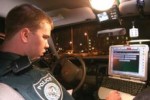Keeping it legal

Sitting in his squad car at 11 p.m. on a Wednesday night, Officer Derrick Warren scans the intersection adjacent to the Sun Dome.
Although he is looking for people speeding, running stop signs and dodging inconveniently placed speed bumps, Warren holds the Florida State Statute book in his lap, looking more like a scholar than a police officer.
“You can get lost in that book really easily,” he said, flipping through the book to find the appropriate law for someone who runs a stop sign.
At 400 pages long, the statute book is a cumbersome object for many officers. However, University Police officers must carry it to ensure that every ticket written is under the proper law.
Until recently, every law enforcement officer in the country used its state’s criminal law book. In February, UP became the first university law enforcement agency in the nation to put all the state’s traffic and criminal laws online.
Using the Criminal Statute Identification Program (CSIP) and the Traffic Statute Identification Program (TSIP), officers can find the law governing any crime almost instantaneously. The software, only recently out of beta testing, is already being used by more than 20 law enforcement agencies in Florida alone.
John Landry, owner of Ten-8 Software Solutions and creator of statute identification software, is confident it’s going to change the way police departments work.
Landry, 42, is a retired police officer from Palm Beach County and knows what it is like to shuffle through hundreds of laws in the middle of the night.
Although the Ten-8 is not affiliated with any government agencies, Landry said the software’s content is as precise as possible.
“We make sure everything is accurate as can be. We have at least six attorneys working at any given time,” he said.
The program, which costs $900 per year for UP, is updated whenever the state Legislature passes a new law.
“It’s much more accurate than the books, which are only published once a year,” Landry said.
The software is also cheaper for some departments. Before UP began using SIP, there were above 45 books in the department. At $27 per book, UP spent just over $1,200 per year to update previous editions, $300 more than the in-car software, according to Capt. Robert Staehle.
The new technology is not without opposition, though.
Some speculate that a drastic reduction in ticket time will lead to an increase in the number of tickets issued.
Staehle and Warren agreed that it would ultimately allow officers to spend more time with their eyes on the road rather than buried in a book.
The new software will reduce the time of a traffic stop by up to 75 percent, Staele said.
He also said the program would foster accuracy and help officers avoid litigation.
Staehle said his department often deals with a diverse spectrum of crime, as people unaffiliated with the University carry out much of it.
Since the software’s initial release in February, Landry has received calls from all over the country, asking when SIP will be expanding to the other 49 states.
While Landry said he was seeking to grow his market share, he stressed the expense as well as the time and manpower needed to implement SIP in multiple states.
“It would be quite a monumental task to take (the program) from state to state,” he said.
While SIP and Ten-8 may be in their infancy, UP is no stranger to using new technology in law enforcement.
“Our agency is recognized for its level of expertise and the willingness to try new things,” said Staehle. “As a result of our innovation, we have now been used as a resource center for other agencies.”
In 1987, UP was the first Florida university police department to offer a rape awareness program solely for men.
Four years later, it became the first campus police department to become a primary answering point – a decentralized call center to which emergency calls are routed – on a county-based 911 system.
The primary point answering system, now used nationwide, allows calls to be routed to the departments closest to emergencies.
Today, UP can pinpoint the call if made from a campus extension, and can also locate the general area if the call was made from a cell phone.
While Staehle described UP as a “department of firsts,” his next goal is for all cars to be equipped with automated ticket printers, further reducing the time of a traffic stop, something that already exists elsewhere.
With the Board of Governors’ recent approval of $18 million for increased security, Warren said he hopes one such ticket printer will be in his car soon.






